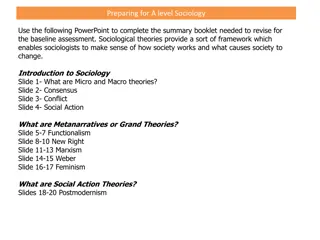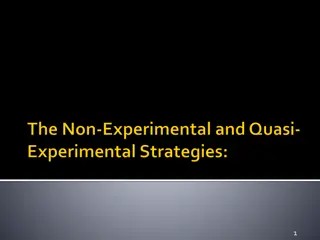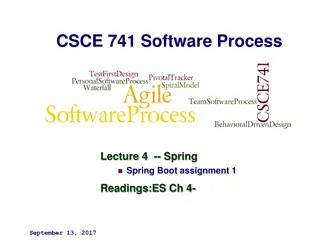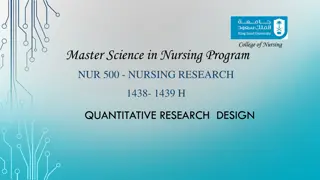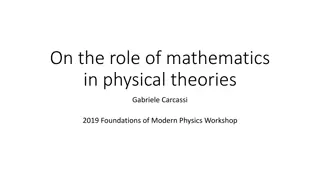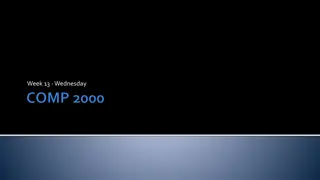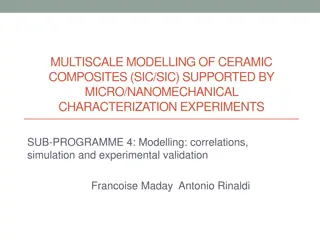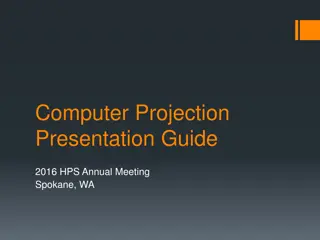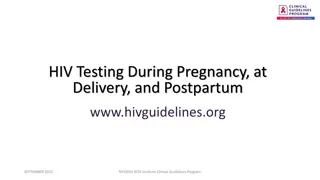Experimental Testing of Physical Theories by Caitlin Mace - HPS 2103 Spring 2022
A detailed examination of the relationship between experimental testing and theoretical complexity in physics, exploring the limitations and implications of conducting experiments within the framework of complex theories. The content delves into the challenges faced by physicists in distinguishing between valid and invalid observations, the concept of theory complexes, and the impossibility of a single crucial experiment in physics. The critical analysis extends to the Newtonian method, highlighting the difficulties in deriving principles from laws and the interplay between Kepler's laws and Newton's theory.
Download Presentation

Please find below an Image/Link to download the presentation.
The content on the website is provided AS IS for your information and personal use only. It may not be sold, licensed, or shared on other websites without obtaining consent from the author.If you encounter any issues during the download, it is possible that the publisher has removed the file from their server.
You are allowed to download the files provided on this website for personal or commercial use, subject to the condition that they are used lawfully. All files are the property of their respective owners.
The content on the website is provided AS IS for your information and personal use only. It may not be sold, licensed, or shared on other websites without obtaining consent from the author.
E N D
Presentation Transcript
D U H E M : P H YS I C A L T H E O RY A N D E X P E R I M E N T C A I T L I N M A C E , H P S 2 1 0 3 S P R I N G 2 0 2 2 1
T H E E X P E R I M E N TA L T E S T I N G O F A T H E O RY D O E S N OT H AV E T H E S A M E LO G I C A L S I M P L I C I T Y I N P H YS I C S A S I N P H YS I O LO G Y Claude Bernard (Physiologist): experimental method depends on intellectual and moral conditions requiring freedom of mind, detachment, absence of animosity. As opposed to those who seek to confirm their own or destroy others theories. But in physics, theory-independence of observation is unachievable. Concrete apparatus on which the physicist tests Schematic and abstract apparatus on which the physicist reasons Theory substitutes the latter for the former Basis of Holism 2
A N E X P E R I M E N T I N P H YS I C S C A N N E V E R C O N D E M N A N I S O L AT E D H Y P OT H E S I S B U T O N LY A W H O L E T H E O R E T I C A L G RO U P Physicists implicitly accepts a theory complex when conducting or reporting on an experiment. Experiments of application: experiment draws on theories Experiments of testing: given a P, derive experimental predictions from P, bring about the experimental conditions which should bring about P. If the prediction fails, P is false. Theory Complex (consisting of P1 Pn) Observation ~Observation Invalid _______________________________________________________________________________________________________________________________________________________ (Holist Underdetermination) ~P4 3
A CRUCIAL EXPERIMENT IS IMPOSSIBLE IN PHYSIC S Hypothesis 1 (H1) or Hypothesis 2 (H2) H1 Observation; H2 ~Observation Observation Reduction to absurdity; crucial experiment showing H1 to be an indisputable truth ~H2 _________________________________________________________________________________________________ H1 Theory Complex 1 (C1) or Theory Complex 2 (C2) More critically, Shall we dare to assert that no other hypothesis is imaginable? (265). Problem of unconceived alternatives > contrastive underdetermination 4
CRITICISM OF THE NEWTONIAN METHOD H1 Observation1; H2 Observation2; Hn Observationn Observation1, Observation2, Observationn until certainty H1, H2, Hn are laws (justified by observation) or mathematical corollaries deduced from laws Via induction and generalization, derive principles. _________________________________________________________________________________________________ Theory complex (directly demonstrated) But in the example, the principles are neither deduced from nor are inductive generalizations of the laws. More critically, Kepler s laws are approximate, permitting an infinity of translations from its symbolic form, and Newton s theory is presupposed when translating Kepler s laws. 5
A R E C E RTA I N P O S T U L AT E S O F P H YS I C A L T H E O RY I N C A PA B L E O F B E I N G R E F U T E D ? Assertion in question ( douard Le Roy): Certain fundamental hypotheses of physical theory cannot be contradicted by any experiment, because they constitute in reality definitions, and because certain expressions in the physicist s usage take their meaning only through them (271). So, given some law in which X is defined by O, if O is not observed, this entails either 1. The definition is right, but since O was not observed, we should reject the broader theory from which our definition is derived. 2. The link between our O and what was observed was not established, and the definition should be altered. The second is more reasonable, but implies that some hypotheses are forever warranted, which the history of science tells us isn t the case. 6
O N H Y P OT H E S E S W H O S E S TAT E M E N T H A S N O E X P E R I M E N TA L M E A N I N G Assertion in question (Poincar ): the principles of mechanics [ ] cannot be refuted by experiment because the operation which would claim to compare them with the facts would have no meaning (274). Such hypotheses are essential foundations of theories and have no meaning isolated from the theory they figure in. E.g., The center of gravity of an isolated system can have only a uniform rectilinear motion. But, again, when the day comes that the theory should be rejected, such principles will crumble alongside it. Hypotheses which by themselves have no physical meaning undergo experimental testing in exactly the same manner as other hypotheses (277). 7
G O O D S E N S E I S T H E J U D G E O F H Y P OT H E S E S W H I C H O U G H T TO B E A B A N D O N E D Given holism about theories under experimental examination, how are weak spots identified? No absolute principle directs this inquiry, which different physicists may conduct in very different ways without having the right to accuse one another of illogicality (277), and further, reasons of good sense do not impose themselves with the same implacable rigor that the prescriptions of logic do (278). Good sense requires moral conditions of impartiality and judgments made on good faith; thus, we are led back to the conclusions of Claude Bernard. 8
MY ANALYSIS 1. Duhem addressed principles of reasoning that govern comparison of theory with facts: Falsification Reduction to absurdity Observation and induction (Holistic comparison) a) These methods were shown to be mistaken (or invalid), yet might good sense require them? b) Perhaps these are better ways of being irrational? 1. 2. Regarding Duhem s Holism: Regarding Duhem s Holism: Hypotheses which by themselves have no physical meaning undergo experimental testing in exactly the same manner as other hypotheses (277). Might we think perhaps more risky hypotheses with physical meaning are under more serious analysis than secured auxiliary hypotheses? Holism is too strong, but we should think that it is not easy to tell which part of a theory should be rejected. 9
MY ANALYSIS (CONT.) Crucial Experiment: 1. Pretend the star did not appear to change position. What in Einstein s theory would have been refuted? Just those parts unique to the theory? Would some scientists try to protect it nonetheless? 2. The experiment served as a confirmation; was it part of an eliminative inference refuting Newtonian mechanics? Retrieved from: https://sciencemeetsfaith.wordpress.com/2018/05/29/arthur-s-eddington- and-the-bending-of-light/ 10
DISCUSSION GEMS 1. Is my analysis correct? Integration of history and philosophy of science 2. What is Duhem right about? Where might he be wrong? Gives us holism, problem of underdetermination, and problem of unconceived alternatives all in simple terms. 3. Do Duhem s concerns extend beyond physics? To what extent? Street cred 11






